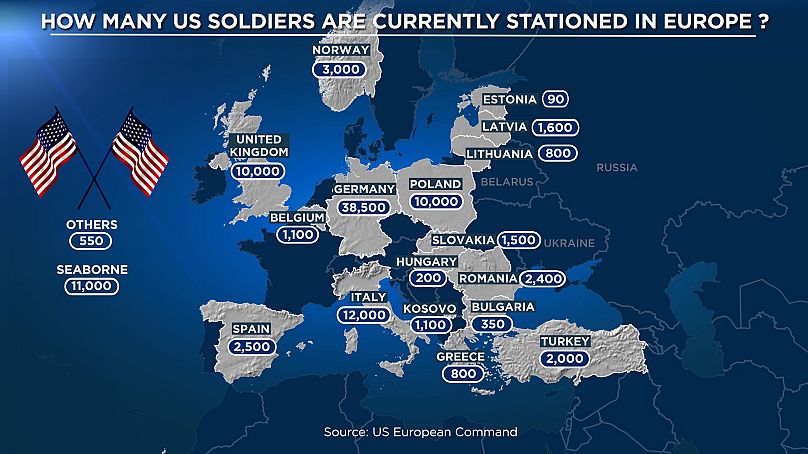Jens Stoltenberg said that hundreds of thousands of NATO troops have been put on high alert since Russia launched its attack against Ukraine.
NATO defence ministers tasked military commanders on Wednesday to come up with measures to bolster the alliance's posture due to the "new reality" ushered in by Russia's invasion of Ukraine.
"We face a new reality so we must reset our collective defence and deterrence for the longer term," NATO Secretary-General Jens Stoltenberg told reporters after the meeting.
He added that ministers have tasked military commanders to come up with options to present NATO leaders.
These are likely to include "substantially more forces" on land, "more allied air power" including integrated air and missile defense, additional submarines and "significant numbers of combat ships", ideas on how "best to draw on allied space assets" and for training exercises to take place "more often and in greater numbers."
Stoltenberg stressed that "major reinforcements of our defence will require major increases in investment" and praised Germany and Denmark for announcing recently that they will up their defence investments.
NATO allies are required to spend 2% of their GDP on defence expenditures but according to NATO data, only 10 of the alliance's member states did so last year. These are Greece, the US, Croatia, the UK, Estonia, Latvia, Poland, Lithuania, Romania, and France.
'Unprovoked and unjustified'
Russia started its invasion of Ukraine on 24 February, claiming its assault was necessary to protect civilian populations in disputed territory in eastern Ukraine and accusing the elected government in Kyiv of carrying out a genocide.
Ukraine and Western allies have flatly rejected these claims and condemned the invasion as "unprovoked and unjustified."
In the months leading to the invasion, Moscow had stationed up to 150,000 troops along its shared border with Ukraine which had triggered high-level diplomatic talks with Washington over the deployment of NATO military equipment on its eastern flank. Russia argued these threatened its security and demanded NATO withdrew troops from some eastern European countries as well as provide guarantees that Ukraine and Georgia will never be allowed to join the transatlantic alliance.
NATO allies responded to the invasion with coordinated sanctions against Russia while some members including the EU, US, UK and Canada have supplied Ukraine with lethal weapons to defend itself.
The alliance also bolstered its positions in eastern member states and strengthened air and naval patrols in the Baltic Sea.
NATO states boost commitments
Hundreds of thousands of NATO forces have been put on high alert while the US has increased its forces deployed across Europe from 80,000 in January to 100,000 — a level not seen since 2005.
Over a third of these US troops — 38,500 — are stationed in Germany while 12,000 are in Italy and 10,000 are in Poland and the UK each. There are 2,500 US troops in the three Baltics countries.
"Personnel are being deployed to reassure our NATO Allies, deter any potential aggression against NATO's eastern flank, train with host-nation forces, and contribute to a wide range of contingencies," the US European Command said in a statement, adding that "some of the forces are rotational so numbers will fluctuate over time."
Ahead of the meeting, US Secretary of Defence Lloyd Austin sought to reassure allies of Washington's continued support, stressing that "we've been clear throughout that we believe that our commitment to NATO, our Article 5 commitment, is iron-clad and you can expect as the president has said a number of times that we will abide by that commitment."
The Secretary-General also said on Wednesday "that ministers agreed that we must continue to provide significant support to Ukraine including with military supplies".
He said that weapons supplied by NATO allies have allowed Ukrainians "to fight back against invading Russian forces" and that this is "extremely important when it comes to what they can achieve" at the negotiating table.
"President Putin must stop this war immediately, withdraw his forces now and engage in diplomacy in good faith," he said.
"What we need is peace in Ukraine," he went on, adding: "We support all efforts to find a negotiated solution."
But he also stressed that the alliance has "no plans of deploying NATO troops on the ground in Ukraine," conceding however that the alliance can draw lessons from the conflict and boost support for countries that might be at risk.
"We now see the value of the support that has been provided to Ukraine before the invasion," he said, and that in the case of Georgia, "we should step up, provide more support."












